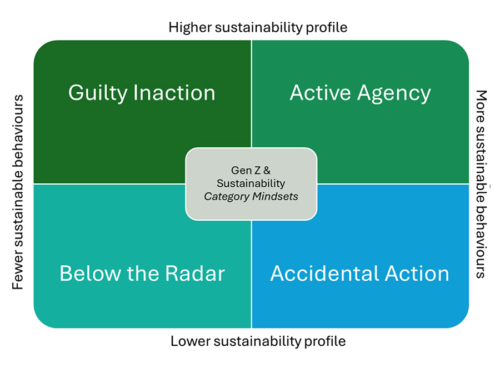
Marketeers understand the importance of Gen Z (born 1997-2013) as the consumers of tomorrow, so in our most recent study we set out to get to know this generation a little better.
Gender matters even more with Gen Z, who are the most divided on gender equality vs other generations, according to a recent global study from King's College (2025).
And this extends to sustainability – for example Savanta's 2022-23 sustainability segmentation found that 48% of UK females were concerned about the negative impacts of climate change, compared to only 37% of males.https://info.savanta.com/savanta-eco-segmentation-2022
In one discussion group during our study, we are discussing flat-sharing behaviours. Mark, 23, observes that he used to be quite good at sorting the rubbish when he lived with his girlfriend. But when he moved in with a few other guys, no-one could be bothered any more. Emma, 25, agreed and mentioned that her female friends are more likely to be cutting back on meat than her male friends. So, are Gen Z women more likely to be sustainability champions than Gen Z men, and if so, why?
Here's how Emma and Mark explained it:
Emma: 'Actually, I never really thought about it as a kind of gender equality thing, but I would say probably sustainability IS more feminine. It's more of a caring type thing'
Mark: 'We men are like robots.. we're just so obsessed with getting to the things that we want, whereas, [women] will look at alternatives.. or actually take the time to look into things'
Academics explain this gender difference by referring back to cultural codes that are embedded in society. Women tend to take on more of the sustainability practices at home because they generally do more care and provision around the house and because they are socialised as 'the carer' Bloodhart and Swim (2020).
This caring role is projected to a broader, societal and planetary level when it comes to sustainability. But if Gen Z sees sustainability as the softer, feminine binary opposite to masculine models of success, is the sustainability project under threat in the current resurgence of traditional masculine values? Or does it have a role in fighting paradigms of toxic masculinity? And what does this mean for brands?
A few opportunities emerge for brands in this 'gendered sustainability' space:
- For brands targeting Gen Z women, sustainability can be an important brand equity-building tool. For example, helping women express their beliefs in sustainable issues and adopt behaviours they believe in. From making recycling easier to championing previously taboo subjects such as periods, sustainability can be a proxy for challenging the patriarchy and /or amplifying the female voice.
- For brands targeting Gen Z men, sustainability issues could be reframed in more 'masculine' narratives of success, performance and status. Tech brands have managed this most effectively, for example with electric cars becoming more aspirational not because they are 'green' but because they offer the most leading-edge driving experience. Huel has brought a cohort of young men (as well as women) into a plant-based diet by tapping into the contemporary codes of gym-built bodies and high protein consumption.
Perhaps more importantly we need to move beyond a gendered approach. Sustainable consumption currently often shows up as a gendered behaviour, but if we are to succeed in adapting to new realities and live within the limitations of our planetary resources, a gendered response will not get us there. Brands have a responsibility – for both altruistic and selfish reasons – to bring both young women and young men along on the journey.
Want to know more about our Gen Z – Connected Lives research series? Get in touch with us at info@brand-legacy.com






